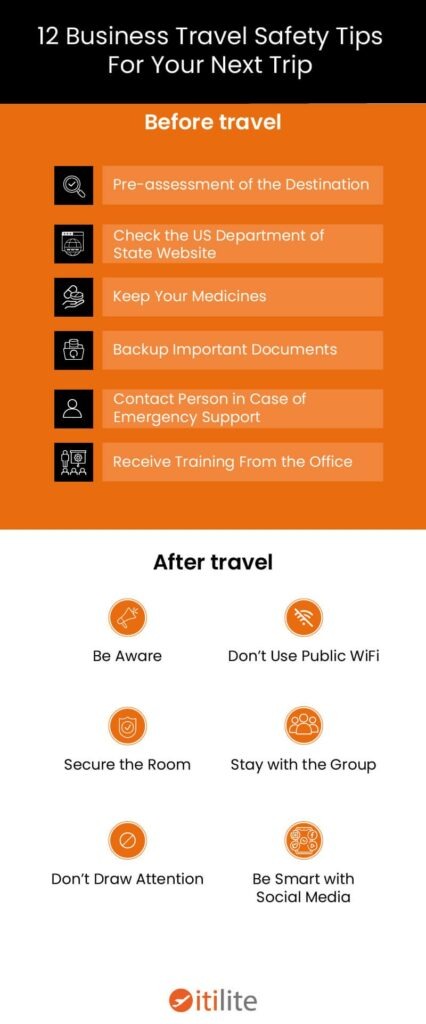
Business travel offers an exciting opportunity to explore new places and forge valuable connections, but it also comes with its share of safety challenges. Navigating unfamiliar destinations, managing packed schedules, and addressing potential risks demand careful planning.
A report by Amadeus reveals that 84% of business travelers prioritize safety measures during their trips. While companies work tirelessly to safeguard their employees, your proactive efforts play a vital role in ensuring your well-being.
To help you stay secure, here are essential business travel safety tips for both pre-trip preparations and your time on the road. Plus, don’t miss the downloadable business travel safety checklist to keep your trip worry-free!

Important Travel Tips for Your Next Business Travel
Effective business travel requires thoughtful planning to maximize productivity and minimize stress. Key tips include booking accommodations and transportation in advance, packing efficiently for convenience, and leveraging tools like travel management software to stay organized and ensure compliance with company policies. Prioritizing rest and safety is also crucial for a successful trip.
Before Travel
Travel safety should not start only during the trip. You must also make some preparations before leaving. Here are some important pre-trip business travel safety tips.
1. Pre-assessment of the Destination
The first step to ensure corporate travel safety is to research the place you are visiting. Here is a list of things you should read up on before visiting a foreign destination.
- The local political situation
- Nearest healthcare facilities
- Emergency numbers (police, ambulance, etc.)
- The best area to book a hotel in
- Local news (ongoing crisis, protests, etc.)
You can take this business travel safety tips assessment a step further by working with your travel manager to conduct a pre-trip risk evaluation. This evaluation will help you prepare a list of the travel risks you can combat and those requiring extra training.
Here are the most common corporate travel safety risks and the questions you should ask to evaluate your preparedness:
Destination-related corporate travel security risks:
- Are you aware of the latest socio-political situation of the destination?
- Have you saved the details(phone no., email address) of the emergency point of contact present on-site?
- Have you undergone any security training to learn about emergency evacuation plans?
Health and Fitness-related corporate travel safety risks:
- Do you have any pre-existing medical ailments?
- Are you completely vaccinated?
- Do you have the necessary health documents?
Data-related business travel security risks:
- Have you backed up essential data?
- Have you taken information security training?
- Have you deployed all the necessary technological tools, like a VPN, to safeguard data?
Here is a customizable traveler risk assessment checklist to help you conduct this assessment in detail.
2. Check the US Department of State Website
The US Department of State offers essential information on their website that you should check business travel safety tips before leaving for a trip. You should check:
- The latest info on other countries with an advisory on whether it is safe to visit.
- Emergency contact of the US Embassy in the destination country.
- Traveler’s checklist.
- Smart Traveler Enrollment Program (STEP) that lets the US Embassy get in touch in an emergency.
3. Keep your Medicines
When traveling for business, you often venture into unfamiliar destinations where access to medical supplies can vary significantly. Preparing for potential health needs is vital, particularly if you rely on specific prescription medications or are susceptible to common ailments.
The availability of your medications might be limited abroad, as they could be sold under different brand names or formulations, or might not be accessible without special permissions. To ensure you’re well-prepared, carry extra supplies of your prescription drugs to cover the duration of your trip and a few additional days for potential delays.
In addition to your prescription medications, bringing general over-the-counter (OTC) medicines can be a lifesaver for handling minor health issues during your trip. Laxatives or antacids can help with digestive discomfort caused by travel stress or unfamiliar food, while pain relievers like ibuprofen or acetaminophen are useful for headaches, muscle pain, or fevers.
4. Backup Important Documents
Before leaving, you should make a copy of all essential documents, such as ID proof, passport, office files, etc. To be more secure, you can scan these documents for business travel safety tips and store them on secure cloud storage apps like Dropbox or Google Drive.
5. Contact Person in Case of Emergency Support
Before going on a business trip, enquire about the contact person with whom you should stay in contact. The person can be your travel manager or a travel agent from the official business travel management company.
It is imperative for your business travel security that you are in touch with a person from your location to report any issues with the hotel’s regulations, hygiene issues, or meals. Your contact can then talk to the hotel regarding the same or move you to another hotel altogether.
6. Receive Training From the Office
Although you might be a frequent traveler who takes multiple trips in a year, it is important to take risk management training before every trip. Ask your travel manager to educate you on-
- The latest travel regulations
- Procedures to follow in an emergency
- Restricted places
- Communication channels
The best way to ensure travel safety is to stay aware of the risks and follow the essential business travel safety tips and guidelines.
During Travel
Here are some safety tips that will keep you safe during your business trip.
7. Be Aware
Business travelers can often be a target for local con artists. Although you have all the right to explore the destination, it is necessary that you stay aware at all times.
Hence, one of the fundamental safety tips for business travelers is that you should try to avoid leaving the hotel at night. Even if you do, prevent the locations with fewer people. You must also enquire about the best routes to travel – the least prone to accidents.
8. Don’t Use Public WiFi
The public WiFi networks are unsafe as they are open networks – accessible to all. Hence, you should avoid using public WiFi networks at airports, local cafes, and the hotel you are staying in.
Instead, use mobile network data for any critical work. However, if there is no choice other than public WiFi, you should use a VPN to secure the network.
9. Secure the Room
Even if you’re staying at a well-regarded hotel that prioritizes premium services and safety for business travelers, it’s important to take additional precautions yourself.
Consider using a small lock on your hotel room door whenever you step out. Additionally, bringing a portable safe can provide a secure place to store your valuables and important documents.
10. Stay with the Group
More often than not, professionals go on business trips with a group. If you are also traveling in a group, please try to take a buddy with you when visiting the local places. Even if you want to roam alone, other team members should know about your whereabouts.
11. Don’t Draw Attention
Try to keep a low-key profile when visiting unfamiliar destinations. You should blend in with the local people by donning the local attire. Also, avoid wearing expensive items, such as jewelry, watches, etc. as it draws unwanted attention.
12. Be Smart with Social Media
Sharing every detail on social media—such as your destination, meals, or meetings—has become a common trend. However, doing so during a business trip can pose safety risks. Refrain from tagging your location, sharing pictures of your tickets, or posting real-time updates about your travel plans.
Follow These Business Travel Safety Tips for Your Next Business Trip
Incorporating essential business travel tips into your routine can make a world of difference in ensuring safe, efficient, and stress-free trips. From staying organized with your itinerary to prioritizing health and safety, these small yet impactful measures empower you to focus on your professional goals without unnecessary distractions.
Remember, preparation is key—plan ahead, stay vigilant, and leverage tools and resources to navigate challenges effectively. By following these tips, you’ll not only enhance your travel experience but also boost your productivity and peace of mind during your journeys.
To make business travel easier, itilite can help you. Our all-in-one travel management platform helps you with booking travel, accommodation and rental cars. Moreover, we provide round-the-clock travel support and live traveler tracking which will help you stay safe and come out of any emergency.














 and then
and then